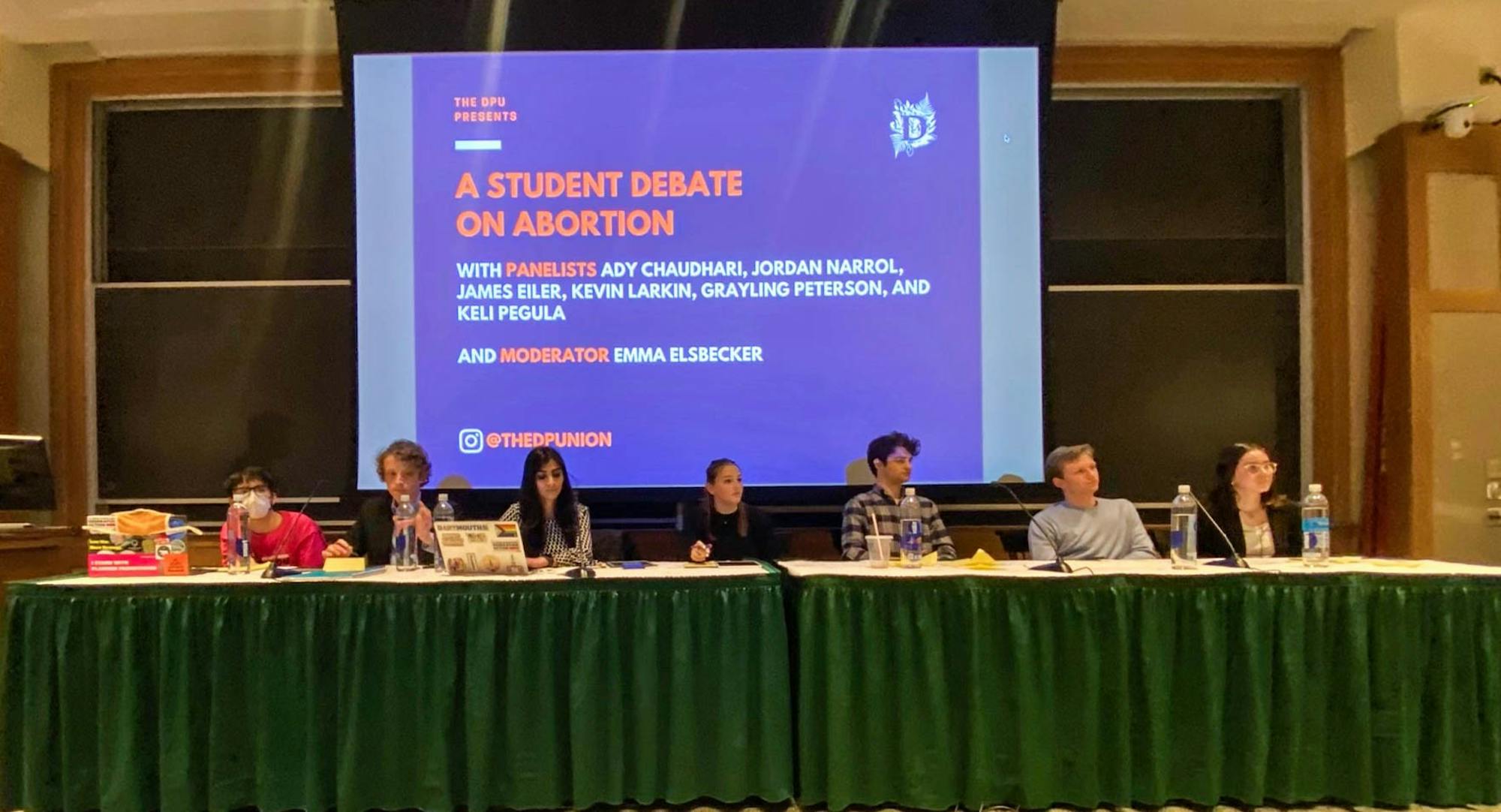On Feb. 23 — less than a week after New Hampshire lawmakers passed a bill that added exceptions to the state’s new 24-week abortion ban — the Dartmouth Political Union hosted a student debate on abortion in Filene Auditorium between six debators: Advaita Chaudhari ’24, James Eiler ’25 and Jordan Narrol ’25 spoke for the pro-choice side and Kevin Larkin ’22, Keli Pegula ’24 and Grayling Peterson ’24 spoke for the pro-life side.
The goal of the debate was not to have a “winner,” but to instead provide a space for student debaters to share their views, Dartmouth Political Union debate director and the debate’s moderator Emma Elsbecker ’24 said in the introduction.
The debate began with each panelist delivering an opening speech and then moved to a discussion, ending with a Q&A section with audience members. Prior to the debate, each panelist took a COVID-19 rapid test in order to participate in the debate unmasked, though some debaters still chose to wear their masks. There were 110 attendees, according to Elsbecker.
Narrol — who spoke first for the pro-choice side — said that according to his research, consciousness first arises between week 30 and week 36 during pregnancy, referring to the Roe v. Wade Supreme Court decision, which protected the right to seek an abortion up to the beginning of the third trimester at week 27. During the Q&A section, however, audience members questioned Narrol’s statements.
“How can you be so confident about consciousness starting at 36 weeks given that the soft problem of consciousness has yet to be solved?” Harrison Fell ’25 said.
Narrol replied that the development of consciousness is a “gray area,” which is why he had initially said the process of consciousness occurs between weeks 30 and 36.
Eiler, also speaking on the pro-choice side, said that “forcing” women to carry on a pregnancy would be “a fundamental violation of [her] individual rights.”
Chaudhari, the final speaker for the pro-choice side, said that according to her research, restricted abortion access does not reduce the number of abortions that occur. She added that the criminalization of abortion contributes to increasing wealth stratification and health disparities.
“When we think about abortion, it’s worth considering abortion as a global health matter, not as one that is strictly moral or governmental,” Chaudhari said.
On the pro-life side, Larkin said that abortion is “murder” and “immoral,” but clarified in an interview after the debate that he does not believe that abortion should be illegal.
“I don’t think I fall neatly into pro-life or pro-choice, in that I think [abortion] is wrong, but it should not be illegal,” Larkin said.
Elsbecker said that planning for the debate began eight weeks ago, with much of that time spent recruiting the “perfect” panel to represent a full range of views.
“We may have two speakers who are more classically pro-life and classically, pro-choice, but [the other speakers] are all on a diverse range in spectrum,” Elsbecker said.
Peterson, speaking on the pro-life side, said that he had not been raised to support one side over the other. He added that it was not until high school that he realized that he did not have an opinion, despite it being such a “divisive” topic.
“I went and I did some research and figured it out for myself,” Peterson said. “I came to the conclusion that scientifically, life does begin at conception.”
Another pro-life speaker, Pegula, compared the number of deaths in World War II and the Civil War to the number of “deaths from abortion” since Roe v. Wade was enacted in 1973.
“Abortion is a violent act against two human beings, the mother and the preborn,” Pegula said.

The DPU advertised the student debate on posters around campus.
The next segment of the event involved a discussion among the panelists.
Pegula asked Chaudhari if she believed a decrease in abortion is a positive outcome of increased sex education and access to birth control.
“Like with any other medical procedure, if you don’t have to undergo it, that is a good thing,” Chaudhari said. “I’m not pro-abortion, I’m pro-choice.”
The final segment of the event involved an Q&A section with the audience.
One audience member referenced former United States surgeon general Charles Everett Koop, who had discredited the idea of post-abortion stress syndrome — a similar syndrome to post traumatic stress disorder where women experience heightened feelings of anxiety or depression following an abortion. The audience member then asked Pegula for her evidence to support her claims earlier in the debate that women who have had abortions “suffer mentally and physically.”
“34% of women have abortions are more likely to experience anxiety,” Pegula said. “37% more likely to experience depression, 110% more likely to abuse alcohol, 154% more likely to develop suicidal behavior and 81% more likely to experience mental health problems in general.”
As a follow up question, the audience member asked what Pegula’s sources were.
“Women who have had abortions,” Pegula said.
Though Eiler said that she thinks no audience member left the debate with a changed mind, he still believed it was a “good dialogue” to have.
“It was very interesting to see people on the pro life side and pro choice flesh out why they believe something does count and doesn’t count as life,” DPU vice president Vlado Vojdanovski ’22 said. “It’s such a fun philosophical question. It’s always good to hear what people other than yourself believe about that.”

Arizbeth Rojas ’25 is a managing editor of the 181st directorate from Dallas, TX. When she’s not listening to DJ Sabrina the Teenage DJ or planning her next half marathon, you can find her munching on a lox bagel.




